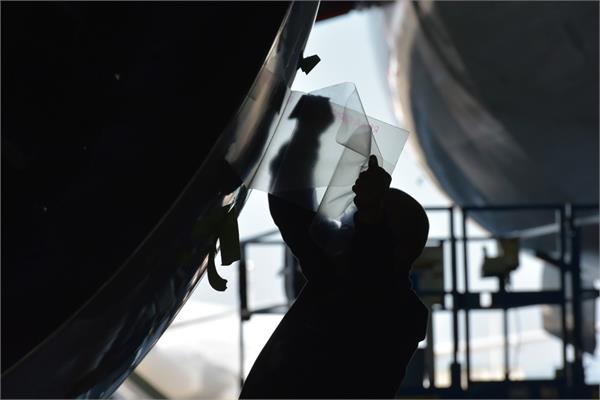
The drag-reducing riblet film developed by Lufthansa Technik and BASF helps airlines save fuel and reduce emissions.
The European Union Aviation Safety Agency (EASA) has granted AeroSHARK the Supplemental Type Certificate (STC), which will officially start the series modification of two further Boeing 777 variants with the fuel-saving riblet films jointly developed by Lufthansa Technik and BASF.
The special surface structure of the microscopic riblets that compose AeroSHARK
reduces the frictional resistance of the aircraft skin. As a result, the fuel consumption and the CO2 emissions are also reduced by around 1%, meaning an annual saving of around 400 tons of kerosene and more than 1,200 tons of carbon dioxide.
A first AeroSHARK-equipped Boeing 777-300ER (HB-JNH) of the Swiss airline, which also completed the flight test programmed for the now-received certification, had already begun daily operations in October 2022 using a temporary “Permit-to-Fly” from the Swiss Federal Office of Civil Aviation (FOCA). The STC issued by EASA now allows Lufthansa Technik to serially apply the nature-inspired riblet films to any Boeing 777-300ER and 777F aircraft.
“The approval of AeroSHARK for the Boeing 777 variants is an important step in the distribution of this new technology for more sustainability in air transport. With our partner BASF, we can now support our customers in making entire subfleets more climate-friendly,” has declared Soeren Stark, the CEO of Lufthansa Technik. “Moreover, we intend to realize the use of the new technology for further aircraft types. We are the only MRO company in the world to offer such solutions to reduce fuel consumption and CO2
emissions for commercial aircraft. We are naturally very proud of this.”
The modification of the HB-JNH plane had already begun at the end of August 2022 and culminated with the STC flights with EASA on 8th
and 9th September, to demonstrate that the new technology had no negative impact on the operational safety and handling of the aircraft. After that period, for several weeks the association evaluated the collected data and other documents, such as measured values from flow simulations. After recently completing its review of all submitted documents, EASA finally granted the STC. SWISS and Lufthansa Cargo will then equip all twelve of their 777-300ERs and eleven 777Fs with AeroSHARK, reducing the carbon footprint of Lufthansa by more than 25,000 tons annually.
“Realizing such a project is only possible through cooperation in partnership and great trust in each other's expertise. Together, we have succeeded in developing a tailor-made solution that combines economic action and sustainability in equal measure. With the Novaflex Sharkskin functional film, we are helping our customers to achieve their individual sustainability goals and, in this way, make aviation measurably more environmentally friendly,” has added Uta Holzenkamp, the head of the Coatings division of BASF and responsible for functional films.